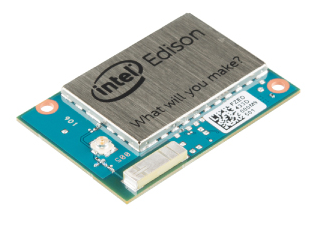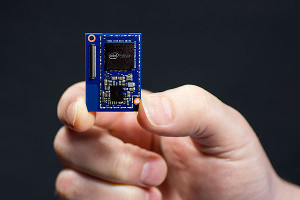The new Edison development platform is the latest in a series of low-cost and product-ready, general purpose computing platforms from Intel that aim to help lower the barriers to entry for all entrepreneurs, from hobbyists and makers to professional engineers and companies working with Internet-of-Things, wearable computing and consumer electronics applications and product development.
The Edison platform includes a robust set of features into its small size, delivering great performance, durability, and a broad spectrum of hardware I/O interfaces and software support. Those versatile features help meet the needs of a wide range of customers and market segments.
Although announced some time ago, the platform is finally in the retail market, which has waited patiently as the Edison packs a large amount of computing power, communications and networking capability into a small, compact package – including an Intel Atom dual-core system-on-chip, integrated Wi-Fi and Bluetooth Low Energy, along with a 70-pin miniature Hirose connector that exposes many GPIO pins and a wide range of different I/O interfaces for connectivity with external hardware.
With these features in mind, Edison is potentially a very useful platform for many of today’s networked, connected embedded computing and Internet-of-Things applications where more computing power is required than can be supplied by a typical low-cost microcontroller along with wireless connectivity.
Edison’s versatile features help this new computing platform to meet the needs of beginners to embedded computing, inventors and makers, as well as experienced users and of course a multitude of commercial applications.
Apart from the integrated hardware, thanks to the 70-pin connector there’s support for more than 30 different industry-standard hardware I/O interfaces – simplifying planning for and integration with peripheral devices and other hardware.
From a software perspective, Edison features out-of-the-box compatibility and support with software and tools such as Yocto Linux, the Arduino IDE, and the Python, Node.js and Wolfram languages. The Edison’s Intel Atom system-on-chip includes a dual-core CPU and an independent single-core microcontroller, integrated memory and storage.
You may be thinking that all this is great, however Edison isn’t suitable for portable applications due to a perceived power issue. Nothing could be further from the truth – although there’s a powerful dual-core processor, WiFi and Bluetooth Low Energy radios on board – it offers low power consumption and a small physical footprint.
Thus the Edison platform is attractive for applications that need a lot of processing power without the size or power consumption constraints of a larger PC or single-board computer. In standby mode with no RF communication, Edison’s power consumption is just 13 milliwatts, increasing to 22 milliwatts with Bluetooth LE active, or 35 milliwatts when Wi-Fi networking is enabled.
The core of Edison is its’ Intel Atom system-on-chip that includes a modern dual-core, dual-threaded 500 MHz CPU along with an independent 32-bit 100 MHz Intel Quark microcontroller, dual-band Wi-Fi, Bluetooth Low Energy, 4 Gb of EMMC non-volatile storage and 1 Gb of DDR3 memory – all in a tiny module the size of a postage stamp – ideal for Internet-of-Things applications.
The unique combination of small size, energy efficiency, computing power and storage, rich capabilities and ecosystem support provided by the Edison module and its surrounding ecosystem of modular hardware blocks inspires creativity and enables rapid innovation from prototype to production for professional, hobbyist or education users.
Created to facilitate rapid innovation, prototyping and product development, Edison can be configured to be interoperable with just about any device, allowing you to quickly prototype simple interactive designs or tackle more complex projects with an embedded computer that offers much more power, on-board storage and networking capability than a simple 8-bit microcontroller.

Furthermore, the Edison platform also supports connectivity to Intel’s new Internet-of-Things Analytics Platform, which enables seamless device-to-device and device-to-cloud communications for your connected devices in Internet-of-Things applications.
However Intel doesn’t just leave you with hardware – their IoT Analytics Platform provides a range of foundational tools for collecting, storing and processing data from your Internet-of-Things networks and devices in the cloud, and for example provides the ability to run user-defined rules on your data stream that trigger alerts based on advanced analytics on the data coming in from your devices.
Overall the Edison offers the product designer an incredible range of hardware possibilities from a reputable brand that knows the business. However implementing your IoT or other product with Edison can be a challenge to get right the first time.
However you can remove the challenge of development by working with experienced partners such as our team here at the LX Group. We have the team, knowledge and experience to bring your ideas to life.
Getting started is easy – join us for an obligation-free and confidential discussion about your ideas and how we can help bring them to life – click here to contact us, or telephone 1800 810 124.
LX is an award-winning electronics design company based in Sydney, Australia. LX services include full turnkey design, electronics, hardware, software and firmware design. LX specialises in embedded systems and wireless technologies design.
Published by LX Pty Ltd for itself and the LX Group of companies, including LX Design House, LX Solutions and LX Consulting, LX Innovations.

